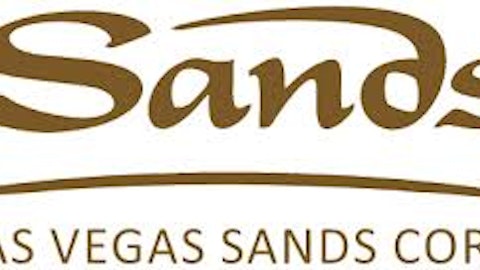When looking at earnings from gaming companies, trying to figure out what all of the numbers mean can be confusing. Revenue and net income are easy enough, but luck plays a role and companies throw out terms like “rolling chips” and “drop” like they’re everyday terms. So, let’s take a look at what those numbers mean and how they impact earnings reports.
How the house works
There are generally three categories in any earnings reports: mass market play, VIP play, and slots. Mass market is simple enough: It’s the average person who walks into a casino and puts money down at a table or into a slot machine. VIP players play on credit and use what are called rolling chips. Slots are just that — slot machines. Here’s what the terms and numbers mean.

Before we dive into the all-important VIPs, let’s start with slots. Not every company reports the same data, but full disclosure would include the following.
1). Slot handle: The amount wagered at a slot machine.
2). Slot hold %: The percentage of the slot handle that is won by the casino.
3). Slot win: The casino’s win, which flows to the revenue line of the income statement.
Below I have two examples, one from Las Vegas Sands Corp. (NYSE:LVS)‘ Venetian Macau and the other from Wynn Resorts, Limited (NASDAQ:WYNN)‘ Las Vegas operations. Note that all numbers in this article are from third-quarter 2012 because not all companies have reported fourth-quarter results.
| Casino | Slot Handle | Slot Hold % | Slot Revenue |
|---|---|---|---|
| The Venetian Macau | $1.26 billion | 4.9% | $61.9 million |
| Wynn Las Vegas | $723.5 million | 6.4% | $46.3 million |
Source: Quarterly SEC filings.
You can see that hold percentage in The Venetian Macau was lower than that at Wynn Las Vegas, a typical difference between Las Vegas and Macau. Las Vegas Sands’ U.S. properties experienced a higher hold percentage, likely due to lower-odds penny and nickel slots.
To put these numbers into some perspective, MGM Resorts International (NYSE:MGM) expects slot hold percentage to be 7.5% to 8.5%, so both of the percentages above are lower than MGM expects every quarter.
Mass-market table games
When you walk up to a blackjack table in Las Vegas and you hand the dealer a $100 bill for chips, they put that money into a drop box. This is what is known as the “drop,” “table game drop,” or sometimes “non-rolling chip drop.” The corresponding casino win is the amount left over when you cash out your chips at the cashier. Win is usually expressed as a percent of drop, which also corresponds to revenue.
Below are mass market drop numbers from three casinos in Macau, including Melco Crown Entertainment Ltd (ADR) (NASDAQ:MPEL)‘s City of Dreams. I’ve also included the expected win percentage for companies that publish such data.
| Casino | Table Game Drop | Table Game Win % | Expected Win % | Table Game Revenue |
|---|---|---|---|---|
| The Venetian Macau | $1.14 billion | 31.3% | N/A | $357.1 million |
| Sands Macau | $739 million | 20.8% | N/A | $153.7 million |
| Wynn Macau | $686.1 million | 30.8% | 26%-28% | $211.3 million |
| City of Dreams | $889.8 million | 27.4% | 25%-30% | $243.8 million |
Source: Quarterly earnings releases.
Think about these win percentages next time you enter a casino. The numbers say you’ll only walk out with about 70% of what you put down at a table.
Where the big bucks are made
In recent years, investors have become focused on rolling chip drop, or VIP play in Macau’s casinos.
When VIP players come into a casino, they don’t set $1 million on the table and ask for chips; they play on credit. Usually this is done with a junket, a company that will borrow a player’s money and collect a cut of their losses from the casino. In Macau, junkets sometimes operate their own rooms, but no matter the arrangement, VIP players use rolling chips, which can’t be cashed out directly for cash — you have to gamble them.
Rolling chip drop or volume is the amount of rolling chips wagered and dropped at the table (like cash is dropped). Winnings are paid out in cash-equivalent chips. A casino records revenue based on how much of the rolling chip play is lost. Here are a few examples.
| Casino | Rolling Chip Volume | Rolling Chip Win % | Expected Win % | VIP Revenue |
|---|---|---|---|---|
| The Venetian Macau | $11.2 billion | 3.32% | 2.7%-3% | $372 million |
| Wynn Macau | $27.6 billion | 3.08% | 2.7%-3% | $850 million |
| City of Dreams | $19.5 billion | 3.2% | 2.7%-3% | $624 million |
Source: Quarterly earnings releases.
With VIP play accounting for a vast majority of casino revenue in Macau, you can see why this win percentage can create very volatile earnings from quarter to quarter.
When reading gaming earnings, remember that rolling chip drop is the same as volume or turnover. Different companies use different terms, but they mean the same thing.
How to use this data
Even the small sample I’ve provided above can be used by investors. You can see that Wynn Resorts generates a large amount of revenue from VIP tables and The Venetian generates far less. On the flip side, The Venetian is a huge mass market location, as is City of Dreams, whereas Wynn Macau is not.
Over the past year we’ve seen VIP play in Macau slow and mass market play pick up. This is why these two companies have seen earnings grow more than Wynn Resorts. These detailed numbers tell the story.
Making things difficult
Not all companies report the same numbers, and some don’t report much of anything at all. While most companies in Macau report a fair amount of data about gaming trends, MGM Resorts doesn’t reveal much data about its operations. Caesars Entertainment Corp (NASDAQ:CZR) doesn’t report much detail at all, not even about its largest Las Vegas operations.
On the flip side, Las Vegas Sands is the most transparent, providing VIP, mass, and slot volume and win percentages at each of its casinos. Hopefully this overview will help next time you see all of these numbers in a company’s earnings report.
The article Your Guide to Understanding Casino Earnings originally appeared on Fool.com and is written by Travis Hoium.
Fool contributor Travis Hoium owns shares of Wynn Resorts, Limited. You can follow Travis on Twitter at @FlushDrawFool, check out his personal stock holdings or follow his CAPS picks at TMFFlushDraw. The Motley Fool has no position in any of the stocks mentioned.
Copyright © 1995 – 2013 The Motley Fool, LLC. All rights reserved. The Motley Fool has a disclosure policy.





